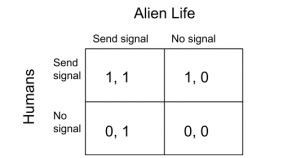Could Game Theory Help Discover Intelligent Alien Life?
Since the establishment of the theoretical framework for game theory emerged, its applications have expanded far beyond traditional games or sports. Researchers have applied the principles of game theory to topics ranging from international relations to behavioral economics, with many more diverse applications in between. In the article “Could game theory help discover intelligent alien life?,” researchers from the University of Manchester reference the paper “Mutual Detectability: A Targeted SETI Strategy That Avoids the SETI Paradox” to suggest that a game theory centered approach, specifically coordination game, can improve our ability to detect extraterrestrial life. The SETI paradox is defined as “the insistent quest for intelligent signals from other civilizations and the persistent aversion to any attempts to transmit such signals from Earth toward probable fellow intelligent beings.” (Zaitsev, 2006) This dilemma is apt for a game theoretic approach.
Researcher Dr. Eamonn Kerins coined the term “Mutual Detectability” to describe the event in which our planet and a planet with alien life can detect each other, if signals are mutually sent during an appropriate window of time. The study further notes that the late Professor Stephen Hawking had suggested that it may be dangerous to send signals to alien civilizations with superior technological capabilities. However, if everyone shares the fear of sending signals to technologically superior societies, no signals will ever be sent and no civilizations will be detected. The payoffs of this situation are shown below.
If both parties send a signal to each other, there is a possibility of mutual detection if both signals are reached. Conversely, if one or both parties do not send signals, there is little chance of reaching each other.
While this article presents a framework for humans and aliens to use game theory to find each other, this system could only be remotely plausible if the recipients we hope to reach are intelligent life forms rather than just unicellular organisms. It can be argued that game theory can also be applied to low level organisms in the case of examining mutation evolution, however individuals in the scenario of detecting alien life must consciously be making choices of when and how to send signals. This example is analogous to the coordination game described in Chapter 6 of “Networks, Crowds, and Markets: Reasoning About a Highly Connected World”. In this example, you and your friend in the mall are lost and cannot communicate with each other, so each of you must decide on an entrance to stand at in hopes that you choose the same entrance so you will be mutually detectable. This directly correlates to the quest to find alien life because humans and aliens may stand at opposite ends of the solar system and need to choose the appropriate time to send a signal to find each other.
Article link: https://www.manchester.ac.uk/discover/news/could-game-theory-help-discover-intelligent-alien-life/
Paper referenced: https://iopscience.iop.org/article/10.3847/1538-3881/abcc5f

